


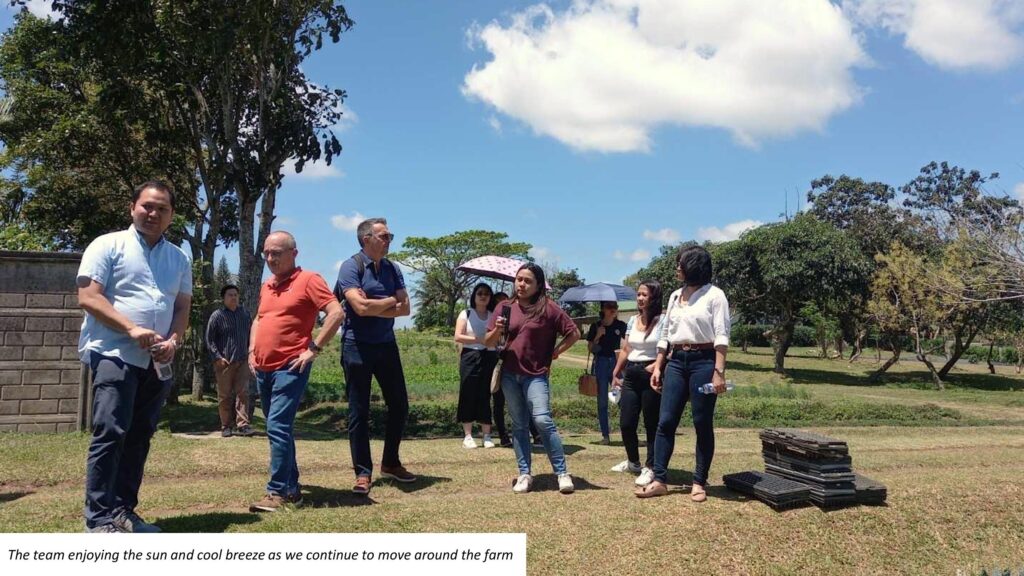
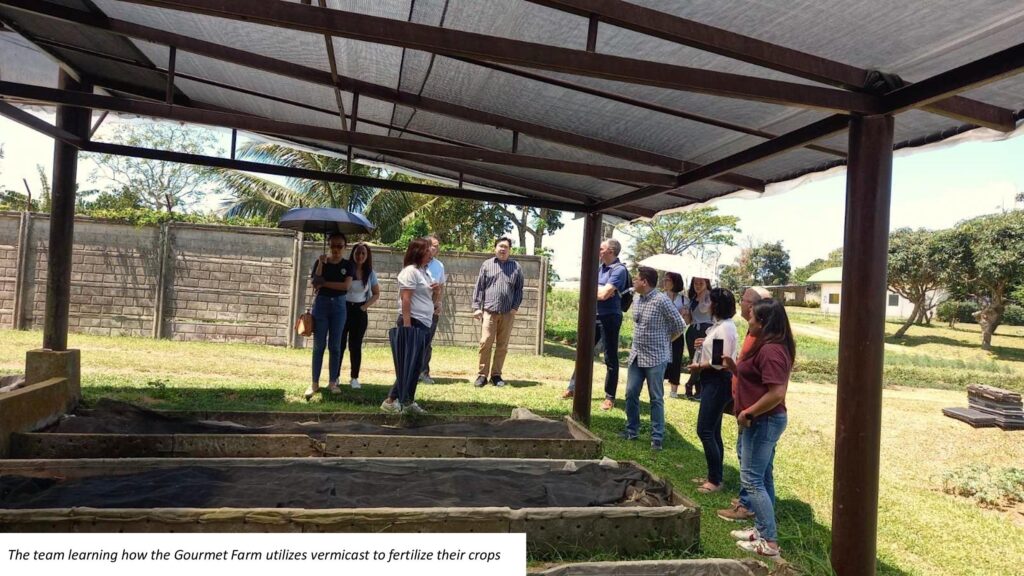







Sustainability in fashion is more than just a trend. Consumers demand it. Thanks to modern technology, shoppers now get more information about every piece they purchase with just a click. The consumers of tomorrow—Millennials and Gen Zs—want wearable items that support their causes, which pushed brands not just to make beautiful clothes and accessories, but something that has more substance in their style.
Proving how sustainability plays in Millennials and Gen Zs’ shopping is Zalora’s Southeast Asia Trender Report 2022. According to the lifestyle e-commerce platform, shoppers belonging to those age demographic “are prioritizing sustainability in their purchasing decisions.”
“Both Zalora’s Earth Edit and pre-loved segments saw substantial growth year-on-year,” the e-commerce platform states. “Total sales for Earth Edit, which focuses on the use of sustainable materials, increased by 152 percent from 2020 to 2021 and continued to have double-digit growth as of Q3 in 2022. Brands have reacted to this trend by expanding their product offerings on Zalora.”
Its pre-loved segment, although still very small, also saw a sharp growth of 70 percent from 2021 to 2022, led by Millennials and Gen Zs who will continue to drive the momentum for circular fashion, as per Zalora.
“As a push towards carbon-neutral continues to underscore fashion and e-commerce, brands can stand to gain market share by introducing more sustainable products while reviewing their supply chains,” Zalora added.
Its report also mentioned how Gen Zs spend most on sports-related products (29 percent), followed by apparel (25 percent). Both Millennials and Gen Zs lean more toward purchasing sports lifestyle shoes and sports performance shoes. Meanwhile, consumers of all ages are also adding to cart sports electronics, giving it a 15 percent growth from 2021 to 2022. Zalora concludes that this reflects consumers prioritizing health and wellness in our pandemic-new normal milieu.
“As for the biggest spenders of wellness products in Southeast Asia, Zalora’s data shows they come from Indonesia and the Philippines,” it says. “Across the region, adults above 40 spent the most, followed by Millennials aged 26 to 30.”
The Trender Report 2022 is based on a comprehensive analysis powered by Zalora’s retail intelligence and data analytics solution, Data by Global Fashion Group, to forecast consumer megatrends and purchasing patterns that will inform and shape retail strategies for 2023. It also includes intel from close to 60 million monthly visits, complemented by insights driven by Google and other partners.
“The nascent Southeast Asian e-commerce landscape is undergoing a significant digital transformation. Even as we brace for the potentially volatile climate ahead, it has become increasingly important for brands and retailers to connect with consumers in the right way,” said Gunjan Soni, Zalora Group’s chief executive officer. “Our flagship state-of-the-industry report helps to guide the industry through this unpredictable time and aid in their retail strategies as they navigate through the region’s diversity and build on the momentum.”
To know more about Zalora’s Southeast Asia Trender Report 2022, click here.

Filipino retailers have quickly adopted live selling compared to their peers in the region as a major platform to push their merchandize to the market, according to a leading tech-enabled logistics company.
In its first ever white paper on Live Selling in Southeast Asia (SEA), the country’s leading tech-enabled logistics company Ninja Van Philippines revealed that 47 percent of Filipino sellers conduct sessions daily, versus weekly average in the region.
The white paper introduces Live Selling as one of the up-and-coming SEA e-commerce trends, and shares Live Selling insights collected from over 1,000 Ninja Van’s e-commerce sellers across Singapore, Malaysia, Indonesia, The Philippines, Thailand, and Vietnam.
While still a nascent industry, the company’s white paper showed that nearly one in three surveyed sellers have tried live selling.
Specifically, Ninja Van said that of those who are already live selling, nine in 10 prefer to do it themselves, and only one in 10 tap influencers to do live selling for them. Filipino sellers are among the most prolific live sellers, with 47 percent doing it daily – against a 31 percent regional average.
More Filipinos than their regional counterparts also believe that live selling brings in new business, with 74 percent saying that attracting new customers is a top driver for conducting live selling. A secondary driver would be to increase profit, with 52 percent of Filipino sellers saying live selling is more profitable than just posting items on marketplaces and apps.
“Live selling is an interesting marketing tactic for e-commerce sellers,” said Winston Seow, Chief Marketing and Enablement Officer, Ninja Van Group. “It’s the only tactic that can fast-track shoppers’ purchase journeys from awareness straight to conversion. Live selling also gives e-commerce sellers the ability to build relationships at scale with their shoppers, both new and existing.”
Filipino sellers can spend up to 14 hours weekly conducting live selling sessions, versus a regional average of up to six hours. Most of the early adopters of live selling are from low-involvement product categories such as Fashion, Beauty & Personal Care, Food and Beverages, as well as Home and Living.
While Shopee (27.0%), Facebook (25.5%), and TikTok (22.5%) are ranked as the top three live selling channels, the close margins signal that the champion has yet to emerge in SEA. This could be explained by the fact that on average, the surveyed SEA e-commerce sellers use two channels for Live Selling, presumably to maximize their outreach to live shoppers.
Sellers also use live selling as a means to build deeper connections with consumers. “Live selling allows us to easily and directly engage with our audience who have become regular viewers of our live sessions. We’ve also seen lower product return rates since we have started live selling,” says Nikka Arasa of Suniega Stainless Products Tradings, a stainless product manufacturer based in Nagcarlan, Laguna.
The white paper further explores the challenges of Live Selling, such as keeping Live Shoppers engaged, preparing on-set logistical requirements, as well as sales and post-sales arrangements, while providing recommended solutions.
The Live Selling in SEA white paper reaffirms the Ninja Van Group’s commitment to understanding the ever-changing landscape in order to provide e-commerce sellers with hassle-free delivery solutions.
Ninja Van Philippines plans to conduct their first-ever live seller accelerator program, designed to equip both new and would-be live sellers necessary skills and seed money to bridge their business to live selling platforms.
With its dominance in Southeast Asian e-commerce logistics, the Group continues to nurture an ecosystem that provides value-added services and tools to ensure a seamless experience for shippers and shoppers alike.
Launched in the Philippines in 2016, Ninja Van’s “Todo Hustle, No Hassle” commitment now serves 100% of the Philippine population, and has made it among the fastest-growing tech logistics companies in the country. Today, Ninja Van continues empowering businesses with fast deliveries, excellent service, and innovative logistics solutions.
Ninja Van Philippines operates the groups largest automated sorting facility in its Cabuyao, Laguna hub.
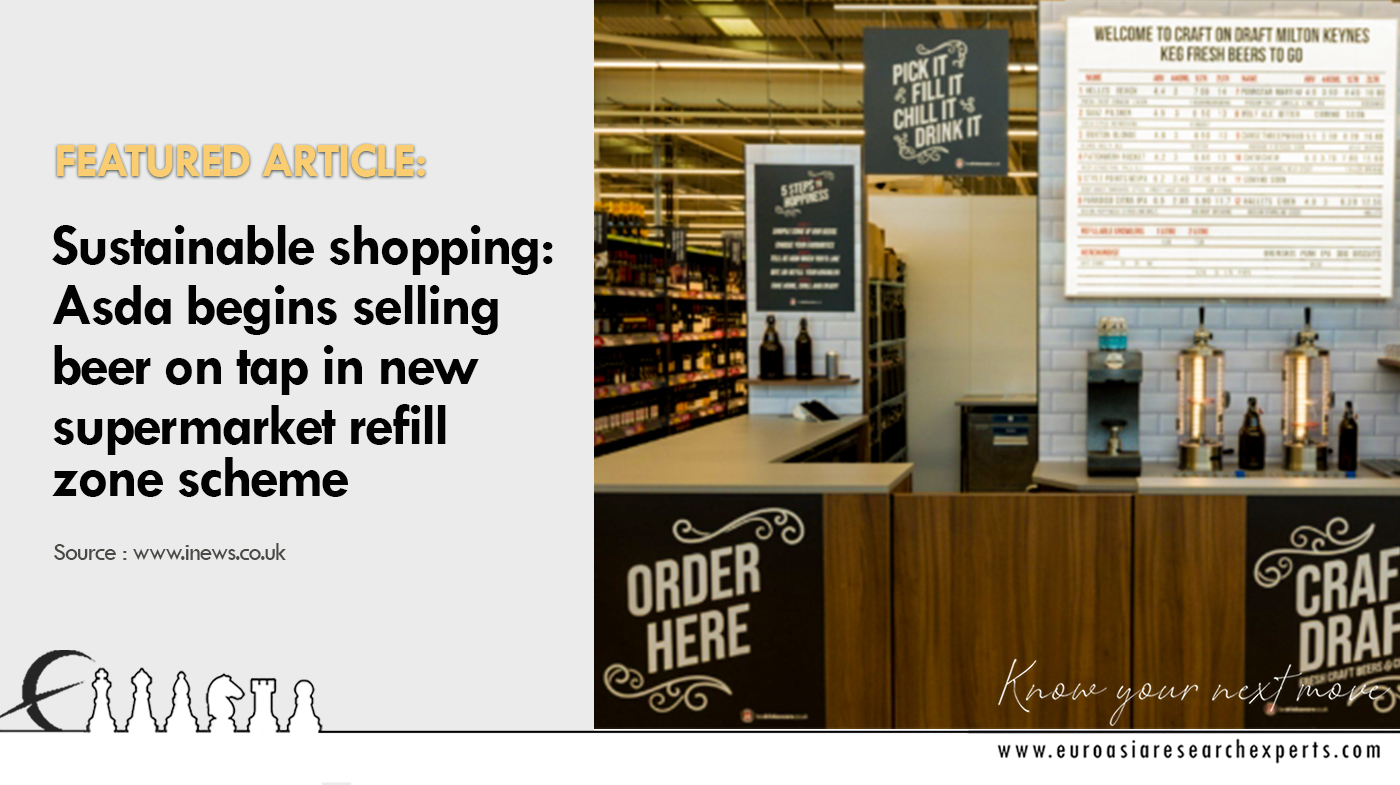
Asda is serving beer on tap to customers in a trial that marks a first for a UK supermarket chain.
Eco-conscious drinkers will be able to take home reusable containers of beer poured fresh from the tap instead of picking up cans and bottles from shelves under the pilot scheme.
Visitors to Asda’s Milton Keynes, Buckinghamshire, superstore can choose from a list of 12 beers and ciders and have a member of staff pour their preferred option into either a one- or two-litre glass container to be taken away and consumed at home.
Customers can keep the containers, bring them back to be refilled or return them, at which point a deposit will be refunded.
If the pilot scheme proves successful Asda said it would consider selling draught beer at other stores across the UK from next year.
The brews on offer will be rotated, with “unusual beers from smaller and local breweries” showcased through the initiative. Craft on Draft, a specialist retailer of craft beers and ciders, will work in partnership with the supermarket to choose and get the beers on the shop floor. Asda said it had brought the business on board with the goal of offering shoppers lesser-known beers that aren’t widely available in other retailers, or in pubs.
The draught beer venture comes in the wake of a series of “refill zone” schemes at Asda, and elsewhere, and amid persistent consumer demand for brands and retailers to eliminate unnecessary packaging.
This summer Asda announced plans to make packaging-free shopping available at more of its stores after the introduction of a trial “refill zone” in a Leeds branch proved popular.
The initiative allows customers to do away with single-use plastic by inviting them to fill their own reusable containers with everyday groceries including cereal, pasta, laundry detergent and pet food. Demand for loose produce was so great that sales of some goods exceeded those of packaged items in some categories, Asda said of the original trial.
Waitrose was the first of the major supermarket chains to test with packaging-free areas in store, in 2019, and has been credited with helping to popularise “refill culture” in the UK.
While glass beer bottles and aluminum cans are widely recycled, environmental experts point out that it still requires energy to produce them in the first place, and their transportation also contributes to greenhouse gas emissions.
Asda spokesman Matt Harrison said of the trial: “The Craft on Draft team’s expertise in the hospitality industry will bring a range of drinks to our store that are unlikely to be found elsewhere and that complement our strong existing beers, wines and spirits offer.
“The refillable element of the trial gives customers the chance to pick up a new tipple and make a small change to help them shop more sustainably in our Milton Keynes store.”

Throughout history, the use of technology has had a significant impact on improving people’s way of life. Humans have been successful in transforming these technologies into innovations – examples are products that promote better health and lifestyle, and processes and services that streamline how we work and how we do things. But the real measure of the impact of any technological innovation will depend on how far we reach out to others. In other words, innovations should not choose demographics, education, age, or income class.
In “The Fortune at the Bottom of the Pyramid” (2007), C. K. Prahalad shared a radical idea combined with substantial research data on alleviating poverty through economic development and social transformation. According to Pralahad, there is an estimated four to five billion people within the global population living with less than USD 2 a day who are at the Bottom of the Pyramid (BOP). Recent data from the World Bank shows that in 2017, an estimated 9.2% of the global population of approximately 689 million people lived in extreme poverty. Last year, the COVID 19 pandemic has increased this number by an estimated 88 – 115 million people (measured through the International Poverty Line of $ 1.90 /day).
Figure 1: The impact of COVID-19 on global extreme poverty
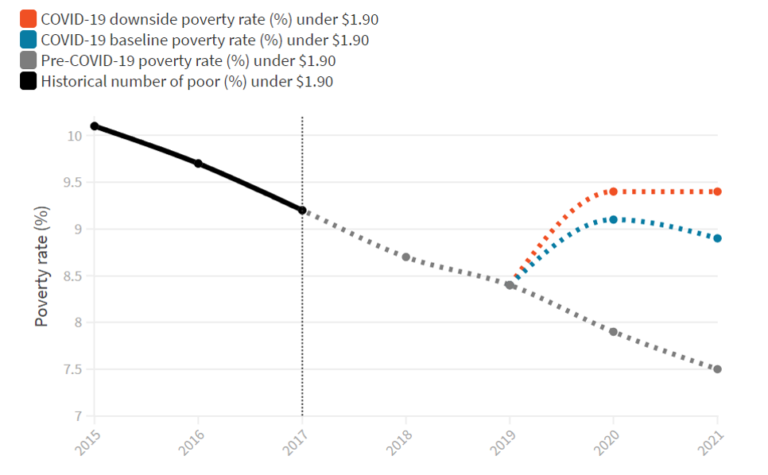
According to studies conducted by Asian Development Bank in 2018, in the Philippines alone, 16.6% of the country’s population, or approximately 17.6 million Filipinos lived below the national poverty line. Additionally, the 2019 data shows that the percentage of the employed population living below $1.90 PPP (purchasing power parity) per day is 2.7%.
Figure 2: Poverty Indicators (Source: Asian Development Bank Statistics April 2020 (adb.org)

This consumer group remains unserved by large businesses possibly due to the lack of strategies on how to reach out to this unique niche market segment or businesses are simply not aware of their potential engagement and loyalty.
Awareness and recognition of the bottom of the economic pyramid and eventually the development of products, processes, and services catering to the “poor” group can potentially lead the way to a new approach in looking at a profitable business. Companies will need a fresh set of eyes and mind to be able to come up with ideas on how they can support this underserved and mostly unbanked population which will impact their lives and for the business to profit in the end.
To help businesses, here are important points of Prahalad’s Twelve Principles of Innovation for the Bottom of the Pyramid which can be used as a guide in creating or investing in technologies for their companies.
Focus on price performance. BOP consumers are looking for products that are affordable and yet come in the full package. With their limited budget, companies should create products and services that are not necessarily cheap but should be value for money with competitive pricing.
Innovate by providing hybrid solutions while blending old and new technology. BOP consumers prefer simplified, useful, and user-friendly innovations. Companies should think of how to transform existing technologies that would meet this market’s needs.
Make it scalable and transportable. In order to reduce cost and maximize sales through high volume, companies should develop products that would cater to the BOP consumers across cultures and languages as well as integrate economies to capitalize and market their products and services across distance and beyond borders.
Reduced resource intensity: eco-friendly products. As BOP Market needs to conserve their resources, companies should find better solutions to come up with products and services encouraging recycling, reduction of waste to create an eco-friendly environment.
Product Design with Functionality from the beginning. The BOP Market would look into practical designs of products and services that would meet their specific needs. Companies should be able to incorporate functionality but also be clear on how their technology will be used by their consumers.
Building process innovations. Standardization of processes combined with proper training can streamline and enhance a better business environment. This in turn can cut down costs and drive additional savings which can be passed on to BOP consumers.
Deskill (services) work. With the application of technology, automation will remove manual tasks and labor-intensive works can be mechanized, automated, and computerized. This could increase output significantly and provide cheaper products. Or companies can invest in technologies that would require fewer skills, therefore, simplifying the process.
Educate customers in product usage. Companies should be able to devise plans and strategies in how to teach their BOP market to be early users to be able to accelerate adoption through customer engagement and tapping influencers.
The product must work in a hostile environment. The environment where the BOP market is different so the overall package of a product should be considered as less sophisticated and should withstand noise, dust, unsanitary conditions, abuse, electric blackouts, and water pollution. Companies should be able to test their products for durability and expiration. Another important factor is making sure that customer support is available.
Simplified and adaptable user interface. Technological applications should be diversified and should be developed by companies to cover a wide consumer base. This will encourage user-friendly products which can lead to higher customer retention.
Innovate in Distribution. Companies should invest in technologies that can improve their procurement, distribution, and logistics in different environments such as dispersed rural markets or highly populated urban markets.
Focus on broad architecture to enable quick and easy incorporation of new features. Future add-on features which are added values to the consumers should be considered when investing in technologies and companies need to ensure that these features are easy to incorporate later on.
As companies use Prahalad’s 12 Principles to guide them in developing or investing in products and services, it is also critical for them to ensure that BOP is present in space. In the Philippines, more than half of the total population as of January 2020 were internet users (statista.com). But according to Bangko Sentral ng Pilipinas latest financial inclusion survey, there is still a wide gap in digital literacy between income brackets. Only 40% of Class E are digitally literate. As companies diversify from offline to online, they can leverage by creating awareness programs and campaigns to transform the BOP into a solid digital market. Converting them as digital consumers is a crucial step in adoption and will therefore play a vital role in any company’s success.
Awareness and recognition of the bottom of the economic pyramid and eventually the development of products, processes, and services catering to the “poor” group can potentially lead the way to a new approach in looking at a profitable business. Companies will need a fresh set of eyes and mind to be able to come up with ideas on how they can support this underserved and mostly unbanked population which will impact their lives and for the business to profit in the end.
With the massive adoption of mobile technology, companies should create strategies to include the Bottom of the Pyramid in their target customers. This population should be viewed as an important, growing, as well as a viable, and profitable market. The BOPs can afford to buy unique, low cost but good quality and sustainable products and services mostly in cash and can be potential loyal customers. And as we move further to a more digital economy, companies can benefit from paying attention and supporting the needs of the Bottom of the Pyramid by incorporating.

The latest Korean Drama or K-Drama craze has hit the country and other parts of the world with the airing of “Start-Up”. Different fan groups of the lead characters were quick to get hyped up, but even non-fans got hooked with the love triangle story that had been a common plot for as long as we can remember, yet we can’t get enough of it.
But besides the obviously enthralling love story, the series is packed with lessons that millennials and young professionals should take note of. Lessons that go beyond love; investments and start-up businesses.
As kids, we grew up with the idea that as long as we take care of our studies and remain competitive in our academics, we will have a bright future ahead of us. Which isn’t a lie. But what we failed to learn while we were young is that the path to success isn’t as straight as what our storybooks have led us to believe. The reality of life usually kicks in when we reach our 20s, thus the term “adulting” came in. Transitioning from the idealistic world of our childhood and the wildness of our teenage to the grueling reality of adulthood could be overwhelming, and even the most promising prodigies can get lost in their paths. For this reason, the show intends people to see that being lost isn’t the endgame, but rather a bump in the road that we need to traverse. No one can be considered a complete failure because there’s still too much to be explored and too much to discover. Most of the time, these major bumps in the road make us see that our paths may not be conveniently straight, but the twists and turns often lead us to where exactly we have to be.

In life, it’s true that one can’t please everybody. The same goes for running companies. A good person would like everyone to be happy with where they are and what they receive. But this can hardly be applied in running a company. As much as you want this, it is impossible to achieve. A CEO should work not to please every employee but to make decisions, no matter how risky or hard for the betterment of the company as a whole. A good CEO is someone willing to take responsibility for the decisions he or she makes.

Just as much as we would like to believe that the corporate world is a friendly place, we have to be very critical with our business affairs, particularly as young professionals. It may be bad to be very cynical up to a point of being pessimistic with everything and everyone, but being extra careful before signing anything will help us in finding the right partner, right clients, and right investors. If a deal is too good, it is definitely a good thing to consult another professional who holds expertise in this matter to give the deal a new interpretation and perspective. Since millennials are still considered new to this stage, finding people to trust and learn from is just as important as enhancing your technical skills.

We were taught from a young age that as long as we excel in Science and Math, we would excel later on in our lives. Usually, the noisy ones are perceived as the kids who will not do very well outside school. But in reality, and after gaining maturity, we realize that this is not always the truth. Our noisy classmates in the past are often the charismatic employees now with the capability and potential to lead teams and companies. This further proves the importance of every part of the team, with varying expertise and strengths in different areas.

One of the most important lessons in the whole series is establishing the reason why you do what you’re doing. Whether it’s for financial reasons, for your dreams, or simply to prove something, this reason would fuel you, especially in the rough times. In a very interconnected world where success became the measurement for your status as a person, it is very easy to get lost doing what society wanted us to do just to be considered successful. The very coveted word is by itself also a reason why so many millennials right now are lost.
The series tells its viewers that it is easier to go through the difficulties as long as the vision, goal, and reason for persevering is clear. Just like in the corporate world, a company has no identity without its vision, mission and goals.

Transitioning from the safety nets of dependency to independent adulthood can indeed be overwhelming. When we were kids, we are often asked “What do you want to be when you grow up?” and we always answer with confidence and a strong sense of aspiration making it seem so easy to someday reach our dreams. But when reality hits, it’s always disheartening to see that no matter how prepared we think we are, there are still so many things that our future experiences are yet to teach us. Adulthood is realizing that we can never really be fully equipped, but we continue moving forward nevertheless. Adulthood doesn’t mean we don’t get scared anymore, but understanding that fear is natural and it shouldn’t stop us.
Start-up as a TV series is so fun and compelling because it greatly depicts the struggles and yet the potential for success for every young professional. It shows the funny side, the romantic side, and the confusing areas that we always find hard to deal with. But more importantly, it is packed with pragmatic life and career lessons that would come very handy in this period in our lives.

Times are changing, and many of these changes will either stay for a long while or continue to persist after the pandemic. The pandemic has accelerated buying trends, thus creating new priorities and psychological profiles of shoppers. This has made understanding consumer behavior more important than ever, yet has never been more intricately challenging. Brands are finding that balance between becoming agile and accelerating digitalization while maintaining brand authenticity and relevance to the market.
The Philippines has one of the longest lockdown and community quarantine relative to the pandemic. Even as contagion is still present, the government is slowly relaxing restrictions to revive the economy. But with thousands either losing their jobs, taking on pay cuts or being placed on furloughs, consumer spending has decreased.
The good news is – PEOPLE WILL CONTINUE TO SPEND.
In fact, the pandemic brought in new retail channels, accelerated digitized transactions, introduced supplemental contactless services such as call/text to order for a store or curbside pick-ups — all anchored on serving customers and keeping them safe. While the on-line and off-line spending combined may still fall short versus the pre-pandemic state, spending continues but will be intentional and controlled in the new reality. With limited budgets, the share of wallets will primarily be for food, personal care, and household cleaning. Travel, leisure, and entertainment will slowly return but will take a back seat behind domestic priorities. The challenge now for retailers is to secure that share of wallet from the adjusted and limited budget for spending.
With the majority of Filipinos still fearing contagion, how will the market respond and behave in the new reality? How should businesses adapt and evolve to better serve consumers? We share our thoughts and observations from our diverse retail and vast market to help chart strategic business directions in order to stay relevant in the highly complex retail industry during unprecedented unpredictable times.
While e-commerce is on the rise and more Filipino consumers have learned to embrace on-line shopping and cashless transactions, consumers will continue to long for the usual ‘experience’. Even as digital shopping provides convenience in a click and offers a much better promise of safety, it fails to satisfy the need for personal connection that physical stores provide. Chatbots fall short in extending immediate response-action that consumers are pampered with by store personnel. For many, shopping is a therapeutic activity where the journey in itself is a form of relaxation and entertainment, while the freedom and ability to see-touch-feel the products are gratifying. In this social human nature for engagement and connectivity lies the security of physical retailing enhanced with technology.
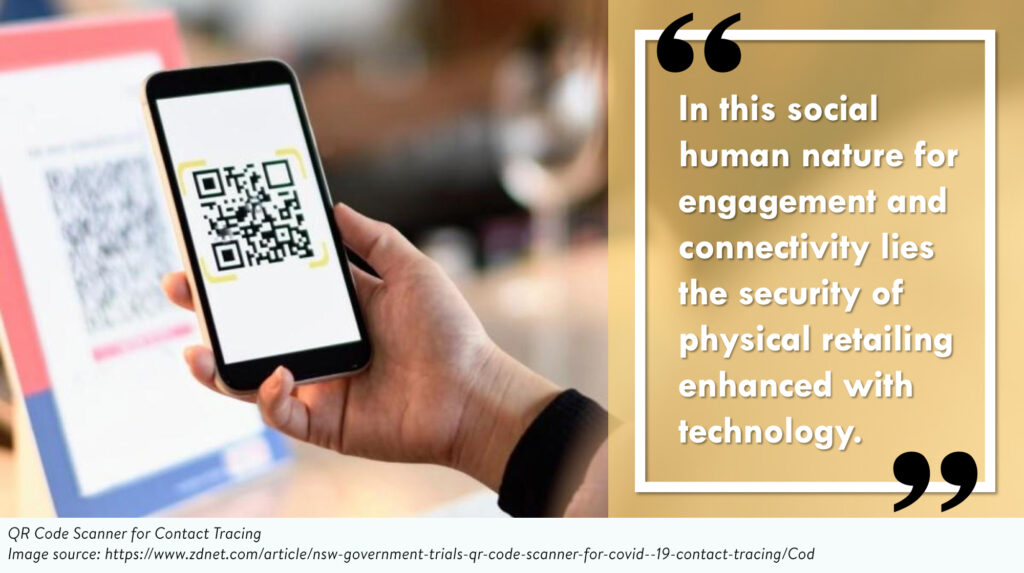
Pre-pandemic, value-for-money was one of the most abused marketing propositions that it has somehow lost its spark. Because it is human nature to value what is lost or lacking, this jargon has finally regained its popularity and relevance. With credits to the uncertainties and unpredictability of the times, VFM is now a critical theme for the new reality. For the consumer, it is getting more for what they paid for. For the retailer, it is acknowledging that one’s role is no longer simply providing the goods at the right time, place, and price; it is addressing the customer’s expectations of paying for goods that have excellent quality, freshness, and affordability. VFM is communicating well to the consumers that money spent in the store, is money that is worked hard for, is patronage that is valued by the retailer.
As soon as news of the virus hit the streets, establishments felt the painful impact of a rapidly declining foot traffic. Shoppers made fewer trips, quicker visits, and fortunately, higher spend. However, the magic touch of impulse buying lost its power, cross-selling and up-selling became more challenging with limited people shopping in-store. In a snap, retailing changed and the agile organizations embraced digital technology and other contactless shopping options, linking brick and mortar to online platforms. If there is anything good that the crisis brought, it is the long-overdue advancement of shopping technology and the overall improvement of convenience and service to customers. In reality, though, this shift in shopping behavior that drove all these retail innovations is due to fear of contagion. To slowly ease customers back into physical stores, retailers must continue to prioritize the health and safety of consumers. Physical stores must not be complacent in communicating and religiously practicing safety and precautionary measures. Consumers will only return to the store or slowly revert to their usual shopping behavior if and only if they are confident and trusting enough of the brand they patronize.
In welcoming the return of warm bodies, store layouts must be adjusted and conformed to evolving habits and preferences. There must be a balance between smart layouts and planograms with considerations for efficient implementation of social distancing, lower capacities, and directed customer flow. It is likely that safety signs and hand sanitation sections will become a staple in every store’s blueprint. The usual visual merchandising tactics – cross-merchandising, free-standing units, animations, on-shelf and off-shelf displays, impulse stacks, sidekicks and end caps – all must be taken more seriously to optimize space planning and drive larger baskets. While every brand is into innovation, this may be the right time to put in place smart shelf technology for aesthetics and customer analytics.
As much as traffic count will be key to survival as pandemic eases, every opportunity must be taken to grow the customer’s basket. Assortment and categories must be reviewed against the evolving market trends and changing customer’s preferences but not to mistake them for the stock-pile pandemic reaction. For instance, the emergence of the home or domestic economy opened the gateways for the baking category to rise from simply being a niche; health essentials became a destination. With issues and concerns on product availability in the past months, brand loyalty waned, allowing secondary or even nameless brands into the retail mainstream. As travel takes the back seat, consumers take comfort in food to take them to places with nothing preventing them from tapping into available channels that could satisfy their global cravings. To secure customer patronage and market interest, variations on relevant assortment must be considered. Simplifying the buying process would be helpful as well in tapping into local markets and growers and start-up entrepreneurs to beef up product offerings. To have a seamless interface across front and back end operations, there may arise the need to reinvest in demand forecasting, assortment and customer analytics to respond to the disruptions in supply networks and in customer behavior as exemplified in the unprecedented COVID-19 pandemic.
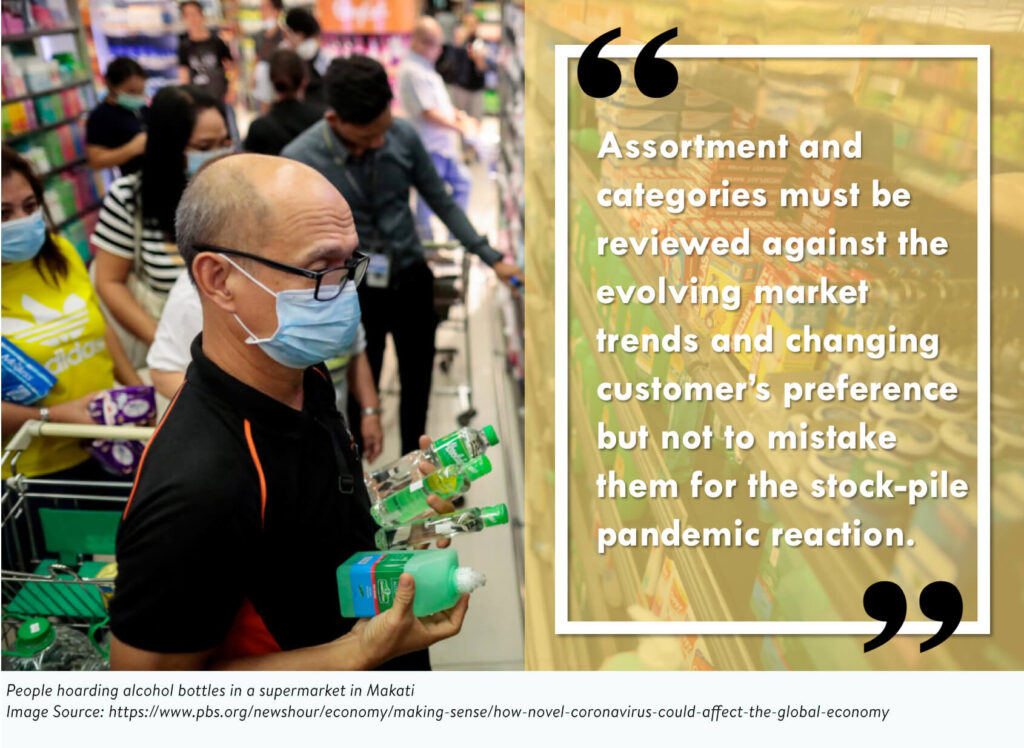
IN CONCLUSION :
For businesses to survive and stay relevant, they need to develop a strong understanding of the aspects of the new realities in retail. Consumers will ease their way into brick and mortars as the pandemic restrictions relax because it is natural for human beings to want to connect and engage – an experience they find more satisfying than e-commerce transactions even as they have learned to adopt it. With paranoia prevailing, there will be fewer trips but with potentially higher spending. Nonetheless, to bring them back into your stores and regain confidence, there is a non-negotiable requirement of being promised health and safety. Faced with decreased customer traffic, lower sales productivity, and inventory issues, brick and mortar stores need to adjust by adding new and relevant product lines to drive sales, rationalize depth and breadth of variations and sizes to accommodate emerging categories. Such adjustments will require interface with store planning and visual merchandising to optimize space. As innovation helps brands to stay relevant, and product offerings and service keep customers’ business, how the brands behaved towards helping others in the midst of the pandemic define the patronage of consumers-turned-advocates. What will continue to resonate in the hearts of the consumers is how brands placed precedence on genuine concern and service for the community it serves beyond business.
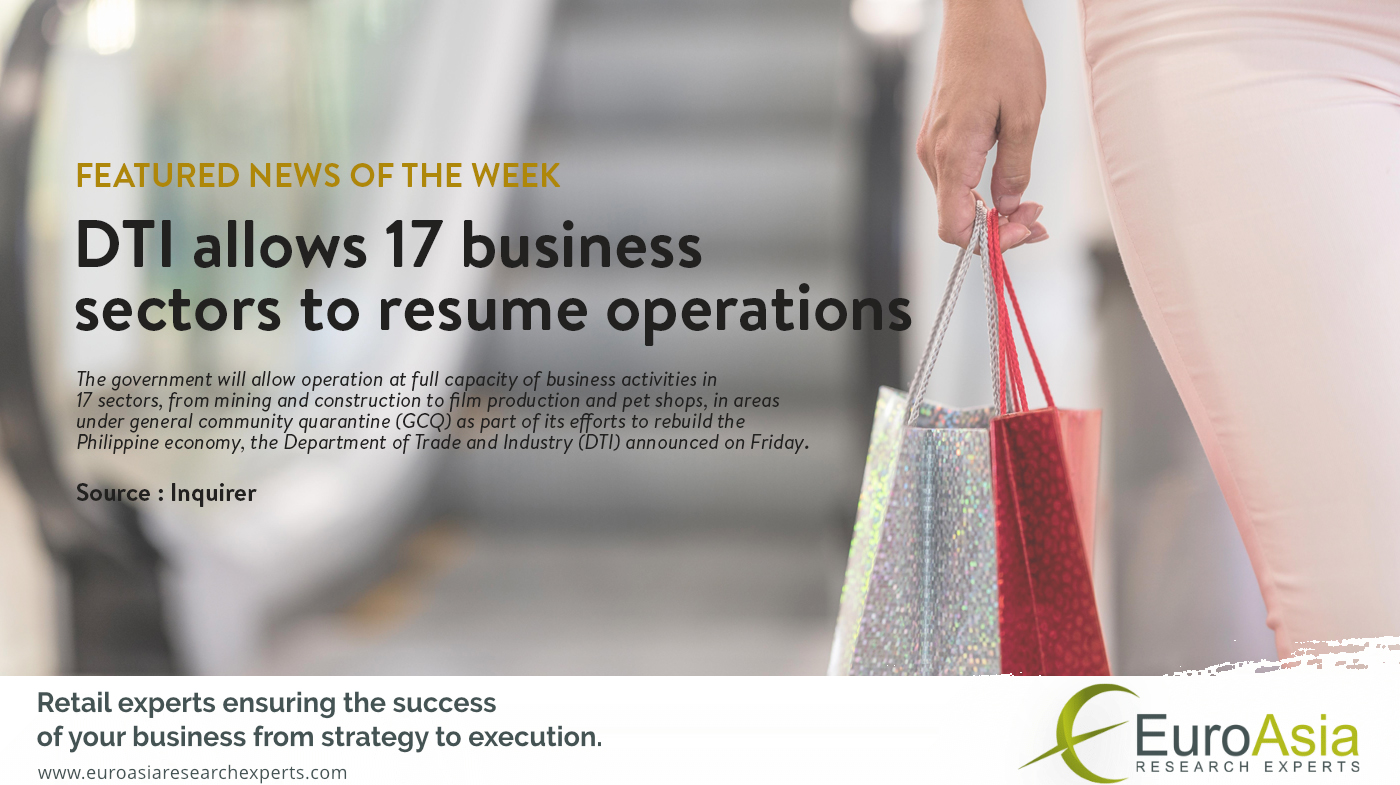
The government will allow operation at full capacity of business activities in 17 sectors, from mining and construction to film production and pet shops, in areas under general community quarantine (GCQ) as part of its efforts to rebuild the Philippine economy, the Department of Trade and Industry (DTI) announced on Friday.
In his Memorandum Circular No. 20-52, Trade Secretary Ramon Lopez said there was an increasing need “to provide stability for businesses, restimulate the economy amid the COVID-19 pandemic, and address the growing number of joblessness, poverty, and hunger incidence in the country.”
The new guidelines in the memo will take effect upon the circular’s publication and filing with the University of the Philippines Law Center.
“The DTI is authorized by the IATF (Inter-Agency Task Force for the Management of Emerging Infectious Diseases) to adjust operating capacity of businesses,” Lopez said, when asked whether the circular still needed approval.
Aside from mining and quarrying, those that will be allowed to operate with 100 percent of their workforce include financial services other than banks, such as money exchange, insurance, reinsurance and lending companies; legal and accounting; management consultancy; architecture and engineering; technical testing and analysis; scientific and research development; advertising and market research; computer programming, information services and related activities; and publishing and printing services.
In addition to government or construction projects also allowed were film, music and TV production; job recruitment for overseas; “other” services, such as photography, fashion, industrial, graphic and interior design; wholesale and retail trade of vehicles; repair of motor vehicles, including car wash; nonleisure activities in malls and commercial centers; and nonleisure wholesale and retail.
The last category covers hardware stores; clothing and accessories; bookstores and school and office supplies; infant care supplies; pet shops, pet food and pet care supplies; information technology, communications and electronic equipment; flower, jewelry, novelty, antique, perfume shops; toy stores except their playgrounds and amusement areas; music stores; art galleries (selling only); and firearms and ammunition trading.
Lopez said that based on regular monitoring activities conducted by the DTI, the businesses in the new list covered in his memo had not been allowed to fully operate under GCQ but were found “compliant with the minimum public health and safety protocols.”
The DTI also considered the Department of Health’s assessment that it now took longer for the number of COVID-19 cases to double in places under GCQ and that the rate that critical care facilities were being used had decreased.
The DTI will also allow barbershops and salons to operate up to 75-percent capacity but “subject to strict physical distancing.”
Dine-in services at restaurants and fast-food establishments are now allowed at more than 50 percent of capacity also with strict physical distancing.
Dine-in as well as delivery services “shall be allowed to operate up to 24 hours a day, as far as practicable, to augment the additional operational requirements and serve the needs of the public, while enhancing income opportunities for workers,” Lopez said.
At the onset of the pandemic, the government, through the IATF, adopted guidelines that classified various industries based on the extent to which business establishments would be allowed to operate under varying grades of community quarantine—enhanced community quarantine (ECQ), modified ECQ, GCQ and modified GCQ.
The Omnibus Guidelines for the Implementation of Community Quarantine listed which industries—or subindustries in agriculture, manufacturing and services—would be allowed to operate at full capacity, partial capacity or not at all.
The industries or economic activities were prioritized and categorized based on whether their output was essential. Thus, establishments engaged in health services were allowed to operate fully even under ECQ. Others not considered essential, such as barbershops and salons, are allowed only partial operation even under GCQ.
The main consideration has been the risk of infection, not the number of people a business employs.
Read original article: https://inqm.news/huvi

For Foreign retailers coming in.
Congress and the executive branch have agreed in principle to lower the minimum paid-up capital for foreign retailers to $300,000 and the minimum per store investment of $300,000 saying this would be attractive enough for foreign investors while protecting small Filipino retailers.
Marikina Representative Stella Quimbo, Board of Investments legal counsel Atty. Elyjean Portoza, and Philippine Competition Commissioner Johannes Bernabe agreed to amend the Retail Trade Liberalization Act of 2000 during a webinar organized by the American Chamber of Commerce of the Philippines.
Under the 20-year old law, the minimum paid-up capital requirement for foreign retailers was pegged at $2.5 million and the minimum investment per store at $830,000.
There have been various pending bills proposing to lower these threshold capital requirements to $200,000 and $150,000.
BOI Counsel Portoza cited the need to adopt the middle ground figures because local retailers are still faced with capability issues to face foreign competition.
Portoza said that having a uniformed $300,000 minimum paid-up requirement and minimum $300,000 investment per store would provide more consistency in its proposed amendments.
Local retailers are also challenged in balancing the production of high-quality goods and competitive pricing.
But setting high capital requirements might discourage the entry of new players in the market.
Nevertheless, she said that the amendments to the investment threshold will encourage the production of high-quality products at a competitive price
Liberalizing domestic retail is also expected to result in the increased flow of capital into the country as an opportunity that would provide them access to needed capital.
It will also promote sound business practices/technological transfers.
On the proposal to include retail e-commerce, the BOI said they have already adopted a policy requiring all those engaged in retail to secure board approval for them to be able to engage in retail online.
For the regulation of the e-commerce platform operator, which is not engaged in retail trade, should not be covered.
The BOI is of the opinion that the retail e-commerce platform operator could be covered by another legislation.
On the proposed review of the minimum paid requirement every 5 years, the BOI said this is just basically institutionalizing automatic review.
But BOI said it might be seen as a very short period and investors might look at it as an unstable policy because investment plans could take longer.
It could discourage investors from fear that policies may change while they are still in the research or implementation stage.
“By the time they are ready to invest there is a possibility, by reason of the provision of this review, rules will change,” she said.
Read original article: https://mb.com.ph/2020/09/12/300000-minimum-investment-approved/

COVID-19 has unmistakenly affected global markets, forcing businesses to explore innovative solutions to overcome the growing negative implications of this unprecedented crisis in what is now known as the new normal.
With products and industries identified as essential and non-essential at a time when the market is stricken with fear and anxiety, convenience and preference as purchase influencers have been overtaken by immediate product availability and trustworthiness in the realm of safety in the new normal.
As with business and among individuals, health is both a concern and a priority.
While consumers stay within the safety perimeters of home and avoid crowds to protect themselves from contagion, businesses strive to be relevant at this time to sustain operations.
As business models are reviewed and reinvented to be financially healthy in the new domesticated economy, there remains the greater concern for the well being of communities that needs to be addressed, an expected non-negotiable consumer requirement from all sectors even when the crisis has settled and restrictions are eased.
Unknown to many, businesses such as supermarkets operating in the midst of a health scare deal everyday with the inestimable difficulties of managing inventory, logistics and other operational concerns including pandemic-related anxieties among frontline employees.
On top of all these and the daily risk of exposure, there are higher expectations from businesses to have a greater sense of responsibility in matters of compliance to governing ordinances and adherence to protocols in the upkeep of public welfare and safety.
The crisis has upended daily operations as we know in a high risk situation that make operations even more complex while enduring the pains to keep the business afloat and serve consumers best.
On the flip side, non essentials work doubly hard on innovating and reinventing themselves to prevent brands from fading into oblivion. Becoming relevant has become mandatory at a time when the propensity to purchase among consumers has not only become limited but very meticulous as well.
Branded apparel lines crossed-over from stylish fashion to much-needed PPEs aligned with their image; others came up with signature face masks and shields that remained true to their brands’ lifestyle edge. Liquor manufacturers produced sanitizers and disinfectants instead. Fast food chains made available bestselling products on the menu in supermarkets to save precious inventory from being written off, and to be perceived as a brand that ’empathizes’ with its consumers at a time like this.
Essential or not, all businesses struggle with challenges and continue to innovate in order to become relevant. The impact on the economy is global, so tremendous that many folded up causing thousands their jobs, crushing hopes and dreams the world over.
If there is anything good this crisis has done, however, is that is has brought people together, unified opposing views, humbled humanity enough to recognize that no one can live alone, bridging differences to rise again.

The situation spared no one – shattering businesses large and small, confining millions to their homes, it has leveled the ground for both economy and society, leaving even the strongest vulnerable to its most destructive effect.
History shows that it is in crisis that the Filipino spirit triumphs.
It gives us pride to witness businesses collaborate and support the with government to help provide the needs of thousands displaced by the crisis. Faceless corporations suddenly showed humanity, prioritizing and providing people in their organization help in every way possible. Consumers patronized MSMEs and start-up entrepreneurs and local products. Even payment deadlines have been extended.
As some formats are forced to cease operations, business leaders back up the ones that remain in service. Others reinvent and rebrand to continue employing thousands. Rising above profits to people, essential businesses are reinforced with providing additional resources and support to cushion the impact on weaker businesses and keep the economy robust.
The unified efforts of the team are what bring success on the water. No matter how strong individual paddlers are, if a team doesn’t work together, the culture of trust and respect won’t be there and the team can’t go far.
We draw inspiration from some examples of business leaders who were undaunted by the seeming hopelessness and helplessness of the economy during lockdown. These are visionaries who instead of withdrawing, marched on ahead in full gear to conquer and succeed.
A retail tycoon courageously enlists his essential business for IPO when stocks are shaky. Instead of taking the hit from other crisis-affected businesses in his conglomerate, the leader tenaciously reinforce his strongest weapon to counter adversity.
Another retail operator practiced transparency with his people, explaining the potential risk of closure brought by the effects of COVID-19. Endeared, he got the full support of his team on improving productivity. Today, the stores are still fully-operational with not one less employee.
A leading local operator stands by the commitment to serve the community best. Despite being embattled by difficulties surrounding the pandemic, genuine concern for the people and community thru efficient service take precedence over profitability. Today, the brand remains endeared as one that would stand by its promise, making it stronger even in the face of giants.
The geese migration routes never vary, year after year, even when the flock members change.
In spring, they will always return to where they were born.
The lesson to learn here is to stay true to our core values and purpose.
Strategies, tactics, and products may change in order for an organization to remain agile, but great companies always stick to their core purpose and values, and preserve them with vigor.
A pandemic is a moment of tough choices. Decisions made now will shape the fate and define the future of millions.
How do we save people’s lives without destroying their livelihoods? Where do we allocate scarce resources? How do we protect those who do not have the means to protect themselves? Should we let go of people to cut down on expense? World leaders, business owners, heads families all over the world are trying to find the balance between being sustainable and being helpful.
The choice is not about which business must remain; rather it is about how to become agile to sustain the weak and emerge together more resilient and united, leaving no one behind.
The pandemic has proven that one law defies gravity.“We actually rise by lifting others. Others do not have to lose in order for you to win. Help others succeed, and we will be successful.” – Francis Kong
We want for every Business to be relevant, to thrive and rise above any challenge, and pivot to sustainable success. We are driven more than ever to work with you to make this happen.